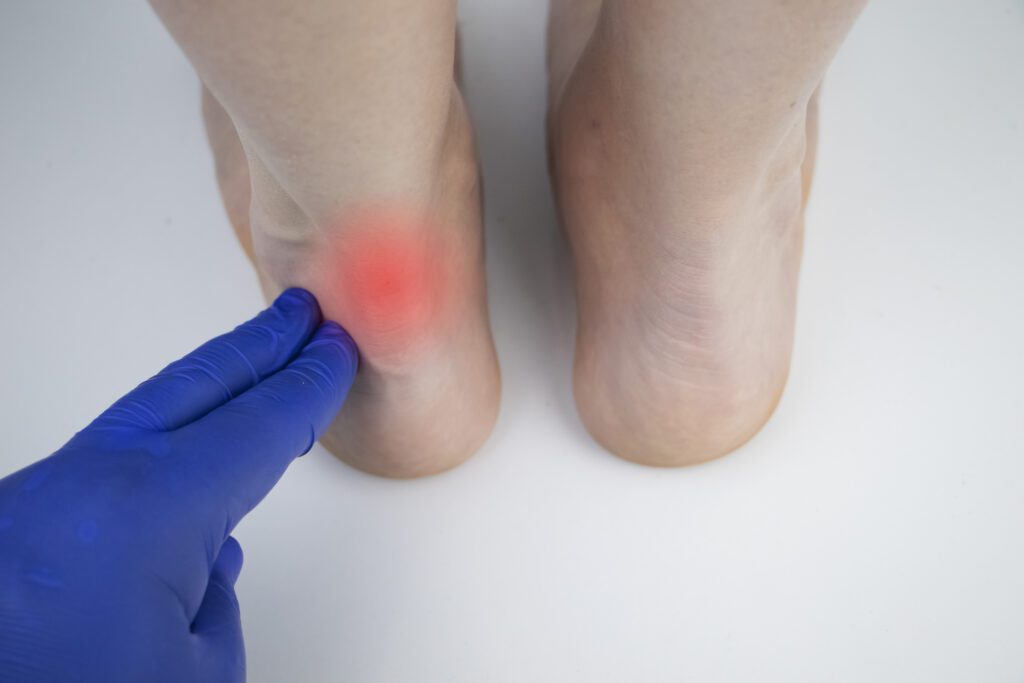Achilles tendon tendinitis is a health issue commonly associated with sports medicine.
Is a condition wherein the Achilles tendon experiences inflammation, leading to symptoms such as pain and stiffness around the area connecting the calf muscles to the heel bone. Typically, the condition is found among athletes and sports enthusiasts due to frequent strain or injury on the Achilles tendon. This, however, does not exempt non-athletes from potentially developing the condition.
Various types of tendinopathy exist, including Achilles tendinitis, an acute inflammation caused by overuse or excessive strain on the tendon, leading to pain. Achilles tendinosis is a chronic type of tendon injury that affects the tendon’s structure due to repetitive micro-traumas. Another is tenosynovitis, an inflammation of the synovial sheath encasing the Achilles tendon, causing symptoms such as pain and stiffness in the affected area. Degenerative tendinopathy is a chronic Achilles tendon disorder characterized by a gradual degradation of the tendon’s structure, caused by either a long period of overuse or acute trauma.
Symptoms Achilles tendon tendinitis
The onset of Achilles tendon tendinitis often comes with early warning signs, including mild pain or stiffness, particularly after vigorous exercise or a prolonged period of rest. Other symptoms include tendon pain during palpation, swelling or redness in the affected area, muscle weakness, or decreased ankle flexibility.
These symptoms of Achilles tendinitis might progressively worsen, posing a challenge to performing normal physical activities or even walking. If these early symptoms are ignored and tendinitis develops further, the pain and inflammation could become severe, necessitating invasive medical treatment for full recovery.
Achilles tendon injuries like tendinitis can be attributed to various causes. Overuse of the tendon, excessive strain, or direct trauma can all lead to Achilles tendinitis. Certain sports involving abrupt stops, repetitive foot movements, and jumping, such as basketball and soccer, can increase the risk of Achilles tendon disorders.
Other factors contributing to the onset of Achilles tendinitis include inappropriate footwear, poor running technique, and training on hard surfaces. Sometimes, systemic diseases like rheumatoid arthritis or an infection can also result in Achilles tendinitis. Risk factors for this condition include age, being overweight, muscle stiffness, and the use of certain medications, such as corticosteroids.
Treatment for Achilles tendinitis depends on the severity of the tendon injury.
- Mild cases might require non-invasive treatment like rest, application of ice, usage of compression bandages, and leg elevation.
- These can help reduce inflammation and alleviate pain.
- Non-steroidal anti-inflammatory drugs (NSAIDs) may also be prescribed for pain relief and to control inflammation.
- Physical therapy is often recommended to strengthen surrounding muscles and tendons, enhance flexibility, and facilitate faster healing.
- In more severe cases, surgery may be necessary to remove damaged tissue and repair the Achilles tendon.
- Alternative therapies, such as acupuncture, shock wave therapy, and laser therapy, may be considered to relieve symptoms and enhance healing.
Foot orthotics can provide significant help in treating Achilles tendon tendinitis.
They reduce strain on the tendon and promote better weight distribution on the foot. Custom-made orthotics are designed to support the arch, improve foot stability and posture, and alleviate pressure on areas of the ankle and heel, which can cause pain or inflammation. Using foot orthotics can also enhance foot biomechanics, reduce the risk of injury, and hasten healing by providing additional support to the Achilles tendon.
Consulting a podiatrist, a healthcare professional specializing in foot and ankle health, is crucial if one suspects symptoms of Achilles tendinitis. The podiatrist can conduct a comprehensive examination of the foot and ankle to assess the extent of the injury. This process may involve physical tests, radiographic examinations, and ultrasounds to evaluate the severity of the tendinitis and recommend an appropriate treatment plan. The podiatrist may also advise on suitable footwear and foot orthotics to reduce strain on the Achilles tendon and improve foot biomechanics.
In conclusion,
Achilles tendon tendinitis is a health issue that affects athletes and individuals leading active lifestyles, as well as those with a sedentary lifestyle. It’s characterized by pain in the back of the leg and heel, stiffness, and swelling. Seeking prompt medical attention if symptoms are present is important to ensure an accurate diagnosis and appropriate treatment. Whether through conservative methods like exercise and NSAIDs or through more advanced treatments like surgery, tackling Achilles tendon tendinitis is feasible with the right medical guidance.
